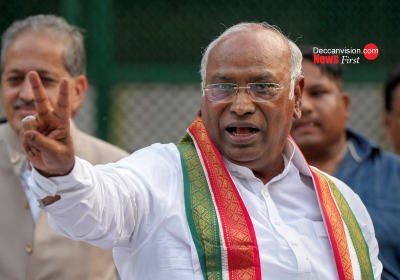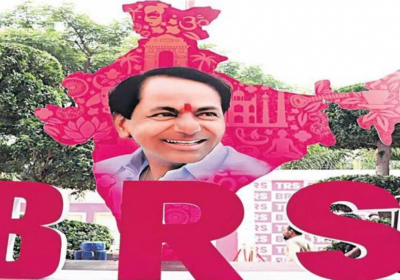BRS offers a paradigm shift in politics

by Dr Manduva Prasad Rao
On the eve of Dussehra, the TRS party has rechristined itself as BRS Bharat Rashtra Samiti. This coinage reflects ongoing debate on compromised federalism in India particularly by the regional parties and some of the agrieved national parties.
Bhartiya Rashtra Samiti can be described as a samiti, a federation, of rashtras, States into union emphasizing the need for assertion of rashtras, that is States. This is in contra-distinction to the name of the Bharatiya Janata party which is akin to our Constitution that describes India as a union of people as Bharatiya Janata Party means Indian people's party undermining the separate identity of the states, both the British ruled states and the princely states that were merged into the Indian union.Though this merger was political, yet cultural, social, educational, economic differences have always existed among the states that led to many conflicts in the country on account of language or sharing of river waters and other natural resources and particularly at present, the economic dependence of some States on the other. In addition, pan Indian religious identities of minorities also played their role in accentuating the differences among the people. During the 75 years of post independence, very little efforts were made to bridge these differences which is the root cause of many avoidable problems in India. Bharatiya Janata party attempted to homigenise 85% of the people under the canopy of hindutva and it has succeeded in its efforts to some extent limited to Northern India but has failed in many other parts of the country as it has created as many contradictions as it has tried to subsume. Reason why it has failed is that it has used Hinduism which in itself is highly divisive factor.
It is,in this context, we must see the formation of BRS by KCR who ever since he formed his first government in Telangana has pursued policies based on the factors that were not divisive but on the basis of the common needs of all the people. These policies helped bridge the social, economic and political gaps between the better off and the marginalised. This is the kind of policies that need to be pursued at National level. During the last several years, particularly since 2019 Lok Sabha elections to the country, he extensively toured the country and met popular leaders. These discussions with the cross section of the Indian society that he met during his tours particularly farmers has given him an idea that policies that he has followed factoring in non divisive identities and common needs of the people such as development, education, health, sanitation, drinking water, environment protection, infrastructure, empowerment of the marginalised disregarding the caste, religious and even ideological rigidities are urgently needed to be followed at National level.
There are other parties in India like AAP- which has focussed mainly on education and health-also share his ideology. The intellectuals from the country from whom he had taken inputs also convinced him of the fact that the policies he has followed in the state provide a panacea for the problems at all India level to solve the fissiparous attitude and provide a sustainable development to the entire people of the country by judicious use of the abandant natural and human resources which have been neglected so far by the top political parties that ruled from the centre with a unitary mentality.
Despite dismal encouragement by and sometimes negative actions from the centre, the development achieved in various fields in Telangana was so visible that people returned him to power a second time and after 7 years still repose in him the kind of confidence which embolden him to take up similar role for the good of the nation and the people of this country.
BRS in the days to come will face daunting task of convincing the entire voting population of this country particularly those who are neglected like the farmers, educated unemployed, uneducated unskilled youth finding it difficult to be employed, women and children,marginalised communities to come under the canopy of his unifying non-divisive policy of equitable development.
He will have to unleash a blitzkrieg of propoganda to take to people his proven policies in all kinds of media. This he can do only with the support of like minded anti-BJP parties like AAP, Trinamool Congress, Communist parties, (CPI already extending support to the party in Munogudu Assembly by-election), DMK and keep away the parties that thrive on caste and religion.
While the BRS will face tough resistence in the form of underhand tactics by the BJP government, the more intractable problem will be the corporate owned media. According to an estimate Reliance alone owns around 800 media sources in different languages across all the media forms.
So far all the parties which harboured national ambitions have failed. Trinamool party has failed in Goa. Only AAP succeeded in Punjab other than its native State Delhi. So a new evidence based propoganda on a gigantic scale alone will cut the ice with the people in the north as the people in the south except in Karnataka are already supporting the secular, development centered policies for decades. The people in the north are highly susceptible to religious, jingoistic and nationalistic rhetoric. To convince them with secular and developmental agendas requires presence of a hidden but suprressed desire to break away from the existing administrative dispensation. This kind of desire was there in Telangana people. After perceiving this rightly, KCR could revolt against the then highly powerful Chandrababu Naidu and start TRS and doggedly pursued it to its logical conclusion. Such perception of a common desire for need and equity based administration seems to have seized the imagination of KCR and hence BRS. It is hoped that he will show same determination and use his informed oratorial skills to convince the people of chosing a set of leaders that are distinctly separate from the existing mileu and bring about a 'metaphysical mutation' , an all sweeping change mentioned by George Monbiot, in his book Age Of Consent.








